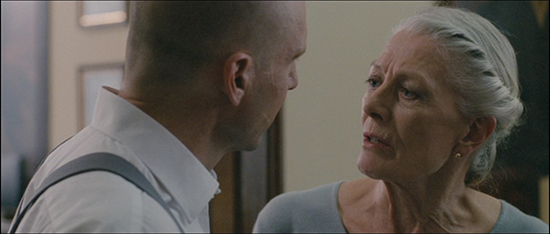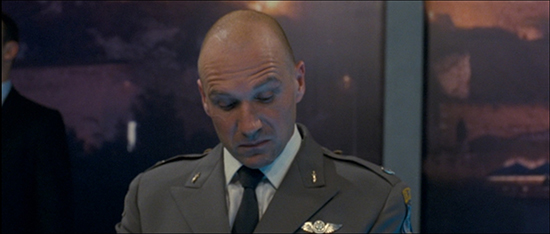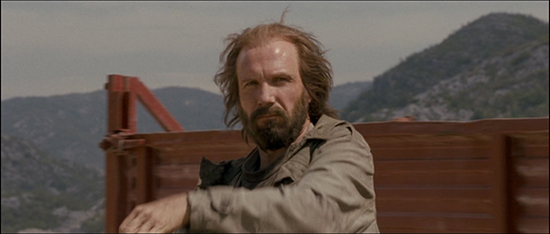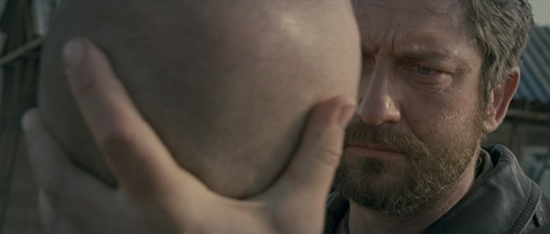 BUY FROM AMAZON: CLICK HERE!
BUY FROM AMAZON: CLICK HERE!
MSRP $14.98
RATED R
STUDIO The Weinstein Company
RUNNING TIME 124 Minutes
SPECIAL FEATURES
- The Making of Coriolanus
- Commentary with Director/Actor Ralph Fiennes
The Pitch
Shakespeare with guns and fuzzy political commentary.
The Humans
Ralph Fiennes, Gerard Butler, Vanessa Redgrave, Jessica Chastain, Brian Cox
The Nutshell
A modern interpretation of William Shakespeare’s tragedy of the same name, Coriolanus is the tale of a Roman general (Ralph Fiennes) who is hated by the people despite being an incredible soldier and military strategist. He contends with the citizens of Rome, scheming Senators, and his own overbearing mother, Volumnia (Vanessa Redgrave). Eventually he makes everyone so angry with him that he is forced into exile and joins forces with his mortal enemy, Tullus Aufidius (Gerard Butler). Together, the two plan to destroy Rome.
The Lowdown
Ralph Fiennes plays Caius Martius, an embittered and generally unfriendly Roman military officer who mocks the people when they beg him for bread. He then goes off to battle, does mildly homoerotic hand-to-hand combat with Tullus, and is hit with a grenade. Both he and Tullus survive, and when he returns home he is promoted to general and given the honorary title of Corolianus. It’s clear pretty quickly that Caius is much more comfortable on the battlefield than at home, as he has a very cold relationship with his wife Virgilia (a very underused Jessica Chastain) and is generally hated by everyone but his mother. She loves him but is also scheming and manipulative. When she hears that her son has been injured on the battlefield, she is ecstatic, as he “must have scars to show the people”. Caius’ relationship with his mother is partially abusive and partially Oedipus-level creepy with lots of long glances and touching.
Mommy Dearest convinces Caius to run for the position of Consul even though he really doesn’t want to. His friend Menenius (Brian Cox, who is fantastic in this) is a powerful Senator that promises to help him earn the position. There’s a lot of dialogue here and it just sort of drags as Caius argues with the Senate and then tries to convince the regular people that he is a worthy Consul. These are the same people that he harassed when they begged for bread, so his campaign doesn’t go all that well. They initially agree to help him, but quickly turn on him; he then begins to belittle them even more. This, of course, starts a riot. Caius goes from being praised to being on trial with citizens calling for him to be executed. He is put “on trial” on live television. The verdict? Banishment.
After some more arguing with his mother, Caius leaves Rome. Apparently a good deal of time passes, because when we see him next he looks like some kind of hillbilly trucker. He tracks down Tullus, who doesn’t recognize him because he has a beard. Caius tells Tullus who he is and begs Caius to kill him in order to spite Rome. (Which is logical, really, since they wanted him dead anyway.) Tullus feels sorry for Caius and asks him to help attack Rome. Caius agrees and goes off to have a shave so that people will recognize him. Many of Tullus’ men shave their beards and heads as well to look like Caius.
News of Caius and Tullus teaming up reaches Rome and everyone flips their shit. Menenius is so terrified that he goes down to the river and slits his wrists. Caius’ mother, wife, and son request an audience with him before he attacks Rome. He grants it and they argue with him in turn. His wife tells him that he’s being foolish, his son tells him that he is going to run away, grow up, and come back to kill his father, and his mother somehow magically talks him out of attacking Rome. Caius leaves the war camp and is attacked by Tullus and his men. He is stabbed repeatedly and then Tullus delivers the final knife to his gut, holding him as he dies.
Coriolanus was originally set in Ancient Rome, in what is now Italy. Director Ralph Fiennes moved it to a fictional city called Rome in what looks like Eastern Europe. (On the “Making of”, Fiennes confirms that the story takes places in modern day Serbia.) The entire story is modernized, removing messengers and pages and replacing them with television news and cellphones. The battles are fought with machine guns and grenades. The one thing Fiennes kept was the original dialogue. Normally with Shakespeare retellings, this is a totally fine decision to make. However, the accents in the film run from Fiennes’ uppity British to Butler’s Scottish lilt to the Slavic-sounding accents of the rebel leaders. The mix of accents makes the flowery language that much more difficult to understand and really takes the watcher out of the film.
By far the biggest problem with the film is the cinematography. Barry Ackroyd, Director of Photography for The Hurt Locker, really should have known that what worked for that film wouldn’t work for this one. Shaky cam is abundant, showing up during scenes of dialogue. The depth of field is also all over the place. Whether an actor is focused on correctly or not seems to be arbitrary. One scene is entirely out of focus for no reason other than it looks artistic.
The cinematography and accents both pull the viewer from the film and overshadow generally good performances. Fiennes is fantastic, Redgrave is amazing, and Cox steals every scene he’s in. Chastain has so few lines and so little to do that she can’t really be praised too much, but when she is doing something she does it well. Butler is Butler, he plays the same character he plays in everything else. He’s likeable and decent, but it’s hard to differentiate this character between other characters he’s played.
The Package
Even though it’s a Blu-Ray, the transfer really isn’t great. It’s very grainy and almost looks pixelated in certain shots. This may have been intentional, but it’s really not good. I imagine that the cinematographer was trying to link the news footage shots and the rest of the film by making everything sort of washed out and grainy. Unfortunately, all it does is make the movie look like something you would find on LiveLeak.
The “Making of” documentary is extremely short, running under five minutes in length. It’s also pretty much just Ralph Fiennes talking about why he wanted to do the movie, and then a bunch of quick snippets of the other actors talking about how great Ralph (pronounced Raef, apparently) is.
Rating: 




Out of a Possible 5 Stars




